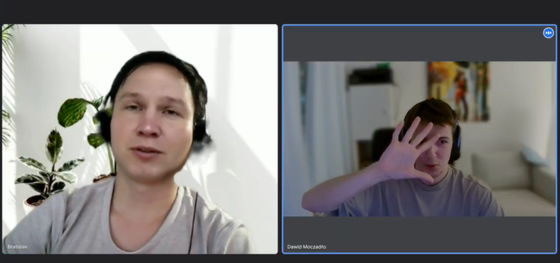The spread of AI has led to widespread distrust in both job hunting and recruitment, with some companies even trying to hire 'non-existent people' created using deep fakes

The proliferation of and reliance on AI tools is making the job market increasingly unrealistic, reports
In AI-era job hunting, bots apply and recruit. Where do humans fit in? - The Washington Post
https://www.washingtonpost.com/business/2025/03/27/ai-job-search-hiring-process/
Jay West, a junior at the University of Washington Bothell, said he has applied to more than 150 jobs in the past few months and used an AI chatbot to help him write his resume during his job search.
Companies also seem to be using AI bots to guide job seekers. West, who was guided by an AI bot to a face-to-face interview, has also encountered cases where 'none of the local staff knew that an interview was scheduled.'
As a result, West felt that 'companies were not taking recruiting as seriously' and that 'no one would even look at my resume.' 'This is becoming a common sentiment among job seekers in the age of AI,' The Washington Post reported.

Job seekers are using AI to create resumes and apply to hundreds of jobs in just a few minutes, using AI software to maximize their chances of being hired, but sometimes this goes too far. Recruiters have more job seekers than they can handle, but some of them are using AI to hide their identities or falsify interview details, making it increasingly difficult to find truly qualified candidates.
Polish cybersecurity company Vidoc Security Lab once used
Therefore, Vidoc Security Lab has announced a method to identify job seekers who use AI to fake their identities, saying, 'Job seekers who use AI to fake their identities may be attempting to steal confidential information and data from companies, and may pose a serious security threat.'
Below is a screenshot of a person that Vidoc Security Lab encountered who had joined an online meeting using a deepfake to disguise his face.

Vidoc Security Lab has been contacted by several companies facing similar issues, including some asking what to do if they have hired someone who has used deepfakes to disguise their appearance and identity.
In addition, Vidoc Security Lab has used AI tools to identify dangerous job seekers who are inundated with applications seconds after the job ad is posted, who don't match details such as the address or date on their resume, who have a resume that is too good, and who refuse to turn on their camera during online interviews.
David Mokzadlo, chief technology officer at Vidoc Security Lab,
Mokzadlo says he is trying to make the hiring process AI-resistant by asking more personal questions earlier and conducting final interviews in person. Vidoc Security Lab is also revamping its hiring process so that AI tools are not used for tasks such as coding.

Vidoc Security Lab uses AI to filter out fake job applicants, but does not use any other AI in the hiring process. However, as AI is being used in every link of the hiring process, from posting jobs online, finding candidates, and scanning resumes to scheduling interviews and interacting with job seekers, approaches like Vidoc Security Lab's are becoming less and less common. At the time of writing, the hiring software market was worth about $3.3 billion and is expected to double by 2032.
The impact of AI on the job market is especially stark in the technology industry, where recruiters and hiring managers say they are seeing a massive rise in a workforce that is overly reliant on AI, making it increasingly difficult to assess job seekers' actual skills.
Elval Freire, who has been recruiting engineers for more than 15 years, said he and other recruiters are facing '
When Freire checked the resumes of the applicants he had collected, he found that many of them were full of errors and inconsistencies. Freire pointed out that 'most of the resumes I read had been rewritten using ChatGPT or Claude,' and noted that it was very difficult to distinguish resumes submitted by real people from those created using AI.
Freire also mentioned that he has encountered people who appeared to be using AI during interviews, such as one who suddenly panicked when asked about his hobbies, then robotically replied, 'My hobbies are running, watching movies, and hanging out with friends.'
On the other hand, some say that resumes rewritten using AI have an overwhelmingly higher success rate than self-created resumes. Freire's wife created 100 resumes and applied for jobs, then rewrote 100 resumes using AI and applied for the same jobs. The results were 'immediately improved.'

In April 2024, the Equal Employment Opportunity Commission (EEOC) released guidelines for the use of AI in the workplace. While companies can use AI to screen job applicants and evaluate employee productivity, downgrading candidates based on speaking patterns flagged by video interview software could violate anti-discrimination laws.
In February 2025, Colorado's AI law to prevent discrimination using AI tools went into effect. In 2026, Illinois will introduce a law requiring employers to notify job applicants and employees when using AI to make hiring decisions.
In addition, a man who developed an AI coding tool to help programmers find jobs, focusing on the advancement of AI in the job market, was suspended from Columbia University .
in Software, Posted by logu_ii